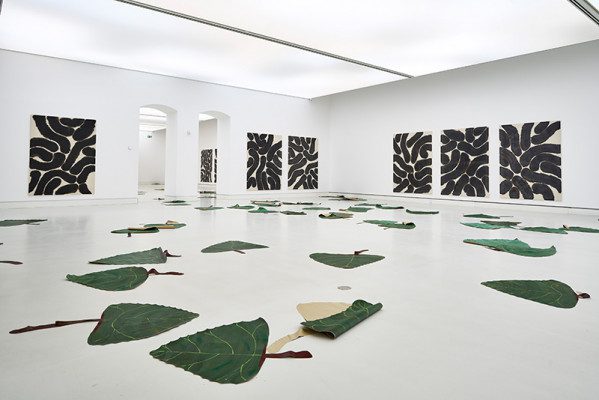Kunsthalle Mainz, Mainz, Germany
12 Jul 2019 - 20 Oct 2019

Installation view room 3: Latifa Echakhch, Populus Nigra and paintings, 2019, Courtesy of kamel mennour, kaufmann repetto, Dvir
The artist Latifa Echakhch is well known for her site-specific installations and interventions. Her works invariably relate to wherever they are being exhibited, specifically to the architecture and local roots. Referring to the formal idioms of Minimal art and Concrete art, she links these to materials such as ink or yarn, and to objects such as books, photographs or mussels, weaving them into her narratives along the way. Latifa Echakhch’s unique feeling for materials is bound up with social-political content and issues concerning cultural roots, the consequences of migration and the significance of revolutions.
The artist was born in Morocco and spent her early childhood there. She then emigrated to France with her parents, where she was confronted with strong cultural differences. The feeling of being uprooted, of being unaware of foreign customs or codes of conduct, the multitude of unfamiliar everyday items – all these shaped Latifa Echakhch, awakening within her a sensitivity for encounters with other cultures. Today the artist lives in Paris and francophone Switzerland, and is particularly interested not only in traversing the boundaries between countries and cultures, between different “homelands”, but also in the resulting scars at the points where they meet. By looking at stereotypes, linguistic codes, and mechanisms for inclusion and exclusion, she addresses the application and processes of national symbols in an age of globalisation. She casts looks at the “other”, and at national and religious identities, reflecting current debates about integration, freedom of religion, the symbolic basis of politics, and political revolts. With minimal use of materials and gestures she lets materials and objects tell their own stories, in the process developing three-dimensional, sensual scenarios.
Liberty and Tree in Kunsthalle Mainz is inspired by the Liberty Tree, a symbol used throughout the French Revolution as well as during the brief existence of the Republic of Mainz. Made mostly of black poplar here, liberty trees were erected as a symbol of freedom and liberation. But more than that, they provided a venue where revolutionaries could meet, where they would dance with each other and sing revolutionary songs. While they initially represented liberty, over the course of time they came to stand for protests against social grievances, economic inequality and societal oppression. Latifa Echakhch uses a range of means and diverse objects and materials to address the meaning of “revolution” in Liberty and Tree. In taking a look at history she brings it to life, indeed conjures it up, yet refrains from glorifying it. The French Revolution forms the starting point for exploring the issue of contemporary revolutions as well as their sustainability and meaningfulness.
Latifa Echakhch’s exhibition in Kunsthalle Mainz brings together the artist’s current occupation with landscape and history, as well as the stage and human beings as a hybrid of past and contemporary developments. She integrates painting, sculpture, video and installation to create a walk-in stage setting resembling a park. In doing so she connects various reference systems, links key moments in European history with recent political developments around the world, and makes the move from the personal to the collective sphere.